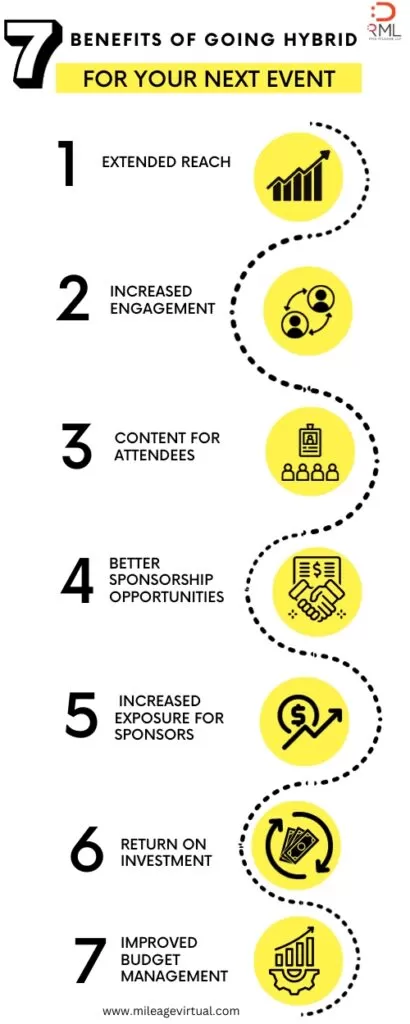
7 Benefits of Going Hybrid For Your Next Event
- Hybrid events are a game-changer in event planning.
- They seamlessly blend physical and virtual aspects, offering numerous advantages.
- This guide explores the benefits of hybrid events and their role in the future of event management.
The Rise of Hybrid Events
The recent global pandemic thrust digital events into the spotlight, demonstrating their immense potential to extend an event’s reach and boost attendee engagement. As the corporate world adapts to this shift, hybrid events have become the new norm, offering a holistic approach to event planning.
1. Extended Reach
Hybrid events have the power to transcend geographical boundaries, reaching a global audience like never before. Unlike traditional in-person events limited by venue capacity, hybrid events break free from such constraints. With the right technology and platform, you can connect with thousands of participants worldwide, both in person and virtually.
2. Increased Engagement
Interactivity is the key to enhancing attendee engagement. Hybrid event management services play a pivotal role in creating immersive virtual experiences that seamlessly integrate with physical events. To achieve a truly successful hybrid event, it’s imperative that the virtual attendees’ experience matches that of the in-person audience.
3. Content for Attendees
Quality content is the backbone of any successful event. In a hybrid event, it’s essential to deliver more than just a live stream of the proceedings. To keep both physical and virtual attendees engaged, you need to curate content that educates, entertains, and fosters interaction.
Interactive elements such as contests, Q&A sessions, live chats, and polls can transform passive spectators into active participants. Thoughtful design, effective lighting, and sound management further enhance the overall experience.
4. Better Sponsorship Opportunities
Hybrid events open up exciting opportunities for sponsors. With a broader and more diverse audience, sponsors can extend their reach and connect with potential customers worldwide. Moreover, hybrid events often offer customizable sponsorship packages that cater to the unique needs of both physical and virtual sponsors.
5. Increased Exposure for Sponsors
Sponsors can benefit from increased exposure and visibility in a hybrid event. Their branding, products, or services can reach a global audience, ensuring a higher return on investment (ROI). Event organizers can leverage technology to showcase sponsor content effectively to both in-person and virtual attendees.
6. Return on Investment (ROI)
Hybrid events provide an excellent ROI due to their expanded reach and engagement. By reaching a larger and more diverse audience, event organizers can maximize their returns. Additionally, the costs associated with venue rental, travel, and accommodation are significantly reduced for virtual attendees.

7. Improved Budget Management
Managing a hybrid event can be cost-effective. While physical events often involve substantial expenses for venue logistics, hybrid events reduce these costs for a portion of the audience. This cost savings can be reallocated to enhance the virtual experience, making it more interactive and engaging.
In conclusion, the benefits of hosting hybrid events are undeniable. These events have the potential to elevate your event planning to new heights, offering extended reach, increased engagement, and improved ROI. By embracing the hybrid model, event organizers can create memorable experiences that cater to both physical and virtual attendees, ensuring the future of event management is both exciting and accessible.
So, whether you’re planning a conference, seminar, or any corporate event, consider going hybrid and unlock the myriad advantages it has to offer. Embrace the future of event planning, where the possibilities are limitless, and the reach knows no bounds.


